Women in Irish farming, women in politics, women in positions of seniority – it was very much in the public spotlight on days such as Little Christmas / Nollaig na mBan. Some don’t agree with gender quotas or the existence of the glass ceiling – others argue that women are definitely still treated as secondary citizens in many areas.
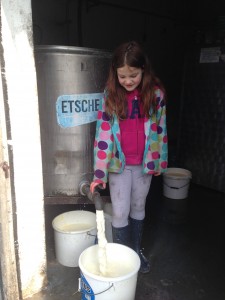 It’s widely known and recognised (both in academic research circles and amongst most farmers) that women’s contributions have long been undervalued on farms. My book recounts some stories of the work that women had to do on the farms for decades. While men took care of the crops and the sale of animals, women milked cows, fed calves, fed poultry, hauled water, fed pigs, chopped sticks, brought in turf and that was before she even started baking bread or washing clothes. ?Milking cows was seen as women’s work by most male farmers until the payment came by cheque and mechanisation was introduced.
It’s widely known and recognised (both in academic research circles and amongst most farmers) that women’s contributions have long been undervalued on farms. My book recounts some stories of the work that women had to do on the farms for decades. While men took care of the crops and the sale of animals, women milked cows, fed calves, fed poultry, hauled water, fed pigs, chopped sticks, brought in turf and that was before she even started baking bread or washing clothes. ?Milking cows was seen as women’s work by most male farmers until the payment came by cheque and mechanisation was introduced.
Now we are in 2014 – is women’s work still undervalued on farms? Are women still an invisible workforce? What about the women who are registered as farmers or who wish to become farmers – are they considered to be ‘true farmers’? What is life like now for women in Irish farming?
Women on family farms have been in the shadows for too long – Lily Mulhall
Farming is too important to be left to the men – Sian Bushell
I was recently at a ‘Women in Agriculture’ forum to discuss research presented by Lily Mulhall on behalf of the National Rural Network and they are publishing their research and recommendations. Here’s a snapshot which makes for interesting reading.
Statistics
27% of the Irish agricultural workforce are female.
There are 70,274 female farm workers of which 15,099 are farm holders, 40,787 are spouses, 12,321 are farm family members and 2,067 are non family farm workers.
13% of Irish farms are owned by women which equates to 15,500. They hold 10% of the agricultural land and 8% of the SFP payments go to women. This is in stark contrast to Galicia in northern Spain where 58% of the women hold land and receive 44% of the SFP.
Very few women under 35 own farms, it is a paltry 0.5%. 27% of the female farm owners are over 65 (this probably means that most are owned by widows).
Only 11% of farmers over 50 have identified a female has a successor to their farm. ?(This scares me as my husband and I aren’t too far from 50! However, as our daughter is 9 and our son is 11, it will be a while before we will be deciding on a successor!)
Issues for Farming women
They interviewed 23 farming women in the South East so the figures aren’t huge but provide a good indication of experiences and concerns. Their issues included:
- Isolation – even going to the mart didn’t necessarily mean they felt like they could have a good chat there. Although most felt they were treated with respect, the fact it is male-dominated affected some people’s self esteem and comfort levels.
- Non access to land
- Succession and Parental attitudes to daughters farming(parents holding on to see if a son might change his mind!!)
- Farming not seen as a suitable career for women
- Some farming wives just didn’t feel valued, felt their opinion wasn’t appreciated or valued. They felt they were kept in their place – used to run errands etc.
- Parents wanted their farm to remain in the family name, believing that if a daughter got married or had children, the family name would be lost.
- Equality in finances was an issue for some too – believe it or not, it still happens that women don’t have control over spending or access to the bank account or else spending is strictly monitored. Incredible isn’t it?
How to get more women farming
These are some of the suggestions presented by the research:
- Parents to encourage their daughters – so need to change some parental attitudes too
- Familarize girls from an early age with farm work – don’t divide work in the house/farm by gender amongst children.
- Give girls good experiences in farm work
- Instill confidence
- Improve career guidance
Recommendations by the NRN research:
- Collect data and measure women’s involvement
- Joint names on herd numbers and payments
- Improve the image of farming women – the farming media could do more to portray farm women in a modern and positive light. (even though?reports on a farming family now tend to describe the farm family as ‘Michael is farming x with his wife Angela’ etc which goes some way to giving them both equality in the farm management. ‘Angela and Michael are farming at x’ would be better. However, many still just provide the name of the male farmer, not his partner.)
- Build on initiatives in social media to promote female farmers and counter negative stereotypes (I was delighted to see this – blogging and tweeting would not only raise the profile of female farmers but would prevent isolation too and encourage networking)
- Improve access to land by providing case studies of successful women farmers, organise facilitated family sessions on succession and inheritence, and raise the age from 35 to 40 for inheritence/stamp duty (not sure I agree with the last one as it might just mean that parents hold onto the farm for longer)
- Improve career advice
- Set up an agricultural course for women similar to the green cert course. This would be available to women of all ages including widows. (I’m not sure I agree with this one either – I did the ‘fast track’ Green cert course when we returned to farming. I was 33 and the other participants were probably 75:25 male:female and a variety of ages. I presume the year long course is mostly attended by those aged 18 so perhaps a course for those over 25 but open to both sexes? ?In case you are wondering why I did the fast track course, anyone can do that course once they have a qualification of a 2 year certificate course or more. ?Incidentally, there was an article in the Irish Times recently and of the current year of students in Kildalton – there are only 3 girls in the class of 131 if I remember correctly. More girls are doing university agricultural courses but not the agricultural college ones.)
- Networking – set up local groups like the ‘Women Who Farm’ group set up by this research. (personally I think this would be useful. Research in business shows that women need more support in business, they don’t have the same levels of confidence or bravado. For example, I’m a member of Carlow Network of Enterprising Women and find it to be full of extremely helpful, enthusiastic and friendly business women which makes for excellent support and networking. I’ve often been part of mixed gender business groups which have been fine. The fact is that the IFA is male dominated. It?has very few females as members and even fewer women attending meetings. Very very few women become chairpersons or other senior roles. Should there be gender quotas in the IFA? I’m sure no woman would like to think she gained her position as a ‘token woman’ but the fact is that men will vote for men of similar ilk, not women. ? It seems that the majority of women attending IFA meetings are there as representatives from the IFA Farm Families and I’ve even heard that their report is delivered last – when everyone has listened to enough and wants to head home or to the bar. Unfortunately, and this one disappoints me, I’ve heard that a woman in power will often put down other women quicker than other men will – it is like the sisterhood becomes foreign when power is reached for many women. ?For these reasons, I personally think there should be gender quotas for at least a generation. Of course, we also need more women registered as farmers so they can attend the IFA as full members. Personally speaking, I think female farm groups would be beneficial for this decade until there is equality within the IFA in terms of respresentation).
- Encourage networking via social media (and this is one I wholeheartedly endorse – let’s get more women farmers tweeting and blogging).
- A ‘Women in Agriculture’ unit in the Department of Agriculture to promote the contribution of women to farming. (Apparently the Australian model has ?a rural women’s unit in their dept of Agric and it has worked well to promote women’s contribution – I have mixed views on this and would like to see more on the Australian model before I comment further – it sounds good but I do think separating the genders, while necessary sometimes, can often do more harm than good. Women don’t want to be seen as different but equal.
My Story
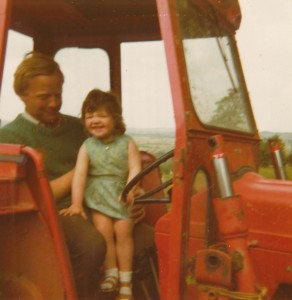 As you can see, plans are in place to encourage and promote women in farming. For those of you who don’t know my story, I will tell you my own situation. ?I was brought up on this family farm with my younger sister and brother. I enjoyed being out on the farm as a youngster – following my dad around the yard, as a passenger on the tractor, feeding calves, stacking bales etc. My father never encouraged me to milk, in fact, he positively discouraged it. Not because he was being sexist in a negative way but he had seen too many case of women being left to do all the housework and yardwork including milking the cows while lazy husbands went to the pub after the mart. While he might have been sexist in seeing feeding calves and housework as more appropriate work for women, he saw the value in that work as a necessary part of a farm – he just didn’t think women should have to do it all and he wasn’t of the generation to don an apron!
As you can see, plans are in place to encourage and promote women in farming. For those of you who don’t know my story, I will tell you my own situation. ?I was brought up on this family farm with my younger sister and brother. I enjoyed being out on the farm as a youngster – following my dad around the yard, as a passenger on the tractor, feeding calves, stacking bales etc. My father never encouraged me to milk, in fact, he positively discouraged it. Not because he was being sexist in a negative way but he had seen too many case of women being left to do all the housework and yardwork including milking the cows while lazy husbands went to the pub after the mart. While he might have been sexist in seeing feeding calves and housework as more appropriate work for women, he saw the value in that work as a necessary part of a farm – he just didn’t think women should have to do it all and he wasn’t of the generation to don an apron!
I never planned on farming – I had a younger brother and presumed he would farm. My husband was brought up on a farm but as the second son, he left the farm to go to university. We both worked in the UK for over ten years, securing degrees and working away. We returned to farm in 2002 offered us the farm. Our son was 3 weeks old when we came back.
I’m the legal farmer here – the farm is in my name, the herd number is in my name. Obviously enough, we have a joint account and equal access to money. However, if anyone asked me for my occupation, I’d probably say I’m a social media trainer. ?In time, I might even describe myself as an author. I see my farming as part-time hence it is my secondary occupation. Once cows start calving, I’ll probably work for 20-25 hours a week feeding calves etc from early Feb to the end of April. The rest of the year I help with paperwork, stand in gaps, help with dosing, collect spare parts and do errands, bring in cows for milking etc. ?I was so busy with the book in November and December that I think Brian realised how many of those jobs I did and how they ate into time as he ended up going on errands etc. As he said one day, he needed his farming wife back and I needed an assistant! ?It’s partly out of respect to other female farmers and indeed, hard working farmers like my husband too that I don’t describe myself as a farmer as my primary occupation. After all, if I was to farm full-time I’d be doing about 70 hours a week here!. Apart from being busy with other stuff, my skin wouldn’t stand it. I have eczema which is kept at bay by one anti-histamine ?a day and keeping an eye on diet. I’m allergic to dairy products, horsehair, cowhair, straw, hay, grass pollens ……. and yes, when I’m feeding calves I’ll be increasing my anti-histamine tablet intake. I could never bed calves for example – the straw would drive me insane.
I quite like this quote by Stephen Fry:?We are not nouns, we are verbs. I am not a thing – an actor, a writer – I am a person who does things – I write, I act – and I never know what I am going to do next. I think you can be imprisoned if you think of yourself as a noun. I write, I teach, I farm, I mother, I nurture ….
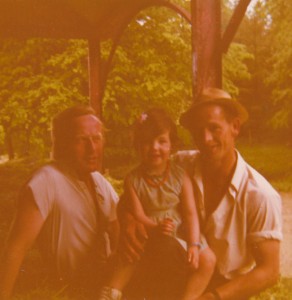 Oh, and I kept my own name when I got married 21 years ago – I did join the James on to double barrel it for a while but hated it. Just use Sixsmith everywhere but yes, although the kids have Sixsmith as ?a second surname they don’t use it -w ay too much of a mouthful. Would it matter to me if my daughter farmed, changed her name on marriage and her children had a different name? I love my daughter so much she could do anything and I’d still think she was wonderful. ?I’d love to see her inheriting here if she wanted to do it. ?She is the apple of my father’s eye too and I think he would share my opinion if he was to live to see her inheriting the farm.
Oh, and I kept my own name when I got married 21 years ago – I did join the James on to double barrel it for a while but hated it. Just use Sixsmith everywhere but yes, although the kids have Sixsmith as ?a second surname they don’t use it -w ay too much of a mouthful. Would it matter to me if my daughter farmed, changed her name on marriage and her children had a different name? I love my daughter so much she could do anything and I’d still think she was wonderful. ?I’d love to see her inheriting here if she wanted to do it. ?She is the apple of my father’s eye too and I think he would share my opinion if he was to live to see her inheriting the farm.
I’m interested to hear what you think of all this. For example, do you think we need a separate women’s unit in the Dept of Agric? Could the media do more to promote the image of women in farming? Do women need female farming groups? Do women need more confidence?






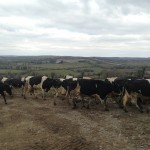
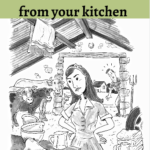
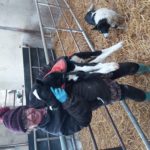
Stephanie
First….I am a Welsh lady farmer but it is very similar here.
My favourite moments are when a rep comes to the door and asks to see the farmer. I like to just say yes and stand quietly on the doorstep letting them fidget.
Stephanie
Lorna
Oh, Stephanie, if only I was calmer, that sounds so much more effective than my way of doing it. Many thanks for reading my post and commenting 🙂
Hope you have a good weekend, Lorna x
abbie mc carthy
I am a woman dairy farming with 20 years love what I do I feel that women are farmers and should be treated the same as any other farmer. Only travellers come into the yard now days and ask for ‘The Boss or himself’ I feel that there should not be a separate group for farm women. Is there a group for women teacher doctors agricultural consultants etc. I for one don’t want to be treated any different to anybody else in my profession. Like everybody else I am better at some things and worse at other things the same as my male counterparts.
Lorna
Hi Abbie, yes, I get where you are coming from and in many ways I agree. However, research into business has shown results that women need more support hence funding is available for women in business networks like the one I am in in Carlow. I agree it shouldn’t be necessary but unfortunately it seems it is – there are too many women wanting to be farmers but not able to do so because of parental attitudes or women not treated as equals by their farming husbands.
Rather than make the women’s unit as just catering for women, it seems it is designed to promote them (the research will be available nationwide soon) and they are following the Australian model which is working well apparently. I’ve tweeted two Australian farmers to see what they think – will be interesting to hear.
Many thanks for your comment, Lorna 🙂